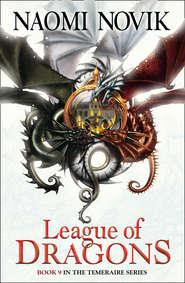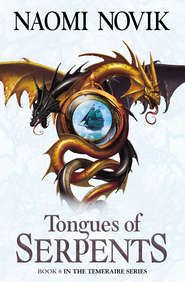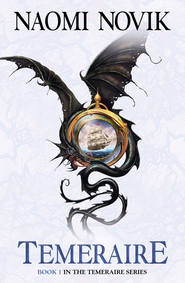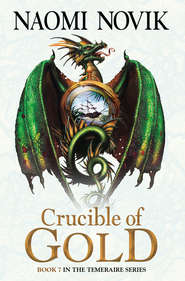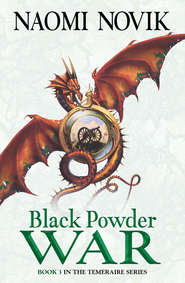По всем вопросам обращайтесь на: info@litportal.ru
(©) 2003-2024.
✖
Blood of Tyrants
Автор
Год написания книги
2019
Настройки чтения
Размер шрифта
Высота строк
Поля
The brown dragon’s harness was odd indeed, as it came into closer view: it was indeed made up of almost pouches of some ordinary fabric, brown wool perhaps, and these were overlaid upon and attached to a fine mesh which covered him nearly from the base of his neck to his tail almost like a shirt, made up of many thin chains—chains of gold, Temeraire realized with a real start, as the sun caught upon them, and so many! although almost entirely concealed by the dull fabric.
“But why would anyone wear gold chains in such a way, where you can hardly tell they are golden,” he whispered doubtfully to Iskierka; they certainly would not be very handy, in a fight.
They could not discuss it: the dragon landed with an easy flip upon the deck before them, and settled himself in the waiting opened place, while Nitidus landed on Temeraire’s back and made himself comfortable.
“Hello,” Temeraire said, inclining his head. “How do you do? I am Temeraire, and also Lung Tien Xiang; and I am very pleased to make your acquaintance: thank you very much for coming.”
“Well, it’s kind of you to ask me,” the brown dragon said, in perfectly good English although broadly accented. “And I am John Wampanoag, of Salem, Massachusetts, at your service,” and he bowed his own head politely as well.
Temeraire said, a little uncertainly, “But surely that is not in Holland?” He was not perfectly sure of the geography of that nation, but there had been a great many places around Capetown, which had possessed Dutch names, and that did not sound in the least like any of them.
“Why, no,” the dragon said, “I am American, you know. That is my ship, the Lacewing,” and gave a flip of his tail in the direction of the Dutch vessel. “She is only under Dutch colors because we have been hired to bring in a cargo, since you have that Bonaparte fellow making hay of things in Europe.”
“Oh, I see,” Temeraire said, although he did not, at all: Bonaparte had conquered the Dutch, he was quite sure. “But is he not their emperor?” he inquired.
The American dragon shrugged. “The fellow in charge here don’t like to think him so,” he said, “and he is the one who can sell my cargo for me and get me my copper for the return road, so I guess what he says is good enough for me.”
“Your cargo,” Temeraire said, a little perplexed, “and your ship—do you mean to say, she is your prize?”
“Prize?” Wampanoag said. “No; I paid to have her built, and I bought the wool cloth and the other trade goods in her belly. Well,” he amended, “if you like to be precise, my firm did so: she is a venture of Devereux, Pickman, and Wampanoag: but as Devereux is in India, at present, and Pickman is back at Salem minding the store, you may as well call her mine.”
Temeraire was staggered, and looked at the rather small and nondescript dragon with new respect: he was well aware that to outfit a ship, even quite a little one, was a very serious undertaking—thousands and thousands of pounds, at the least, and Wampanoag spoke of laying out the money for it as a matter-of-course, and buying cargo besides. “I do not suppose,” he ventured, “—would it be quite rude of me to inquire, where you got the funds?”
“From other ventures,” Wampanoag said. “I have been to the South Seas half-a-dozen times, and to India; we do a pretty brisk business in tea, I can tell you.”
“Yes, but where did you get the money for the first one,” Temeraire clarified, rather urgently. “—your capital, I suppose I mean.”
He did not wish to be distracted from his original purpose for long, but he felt he could scarcely overlook such an opportunity as Wampanoag had just unexpectedly presented, of finding a way to restore Laurence’s fortunes. A gauzy and splendid vision hung before him: Laurence rescued, Laurence back aboard the ship with him, on the way to China again, and very offhand, very casually, when they were alone on deck with the ocean slipping by Temeraire would say, “By the way, Laurence: I have brought you back your ten thousand pounds which I lost you, and I hope you will put them into the Funds, straightaway.”
Of course it could be done with prize-taking—Temeraire knew that, and Iskierka was forever nagging after finding some, but Laurence did not really approve of that. A prize taken legitimately, in the course of one’s duty, he thought was very well; hunting after prizes for their own sake he frowned upon. Laurence would not be satisfied, if he were to ask where Temeraire had got the funds—and he would ask, Temeraire was glumly certain—should he hear, as answer, by taking prizes. And Temeraire had forfeited his own share of the perfectly correct prizes which he and his company had taken during the invasion of Britain, when he had been transported away with Laurence; those had all gone to building pavilions, back in Britain.
“I had a good bit from the tribe, when we formed the firm, which I have since bought out; but of course they would not go in with me until I showed I could raise some funds of my own,” Wampanoag said. “I began with doing some cross-country carrier work, for other firms, and when I had shown I was a steady fellow and was not going to go haring off with someone’s cargo, good old Devereux gave me my chance and hired me to be agent on one of his Indiamen, with two points of interest. When I had realized my share from that journey, the tribe went in with me, and Devereux’s third son, and Pickman, to outfit our first ship; and we have done pretty well for ourselves since.”
“Cross-country,” Temeraire said, latching on to the first part of this nearly incomprehensible narrative, “—across your own country?”
“From Boston to the Kwaikiutl, on the West Coast,” Wampanoag confirmed. “It’s a good deal cheaper, you know, to carry things dragon-back instead of sailing all the way round.” Then he sat back and looked at Temeraire with a tipped head. “I beg your pardon, am I being a dullard? Are you looking for work? There’s not quite so much call for heavy-weights in shipping, as the cost of your feed is difficult to make back; but there is a particularly fine timber, on the West Coast, which I have been thinking might make it profitable to get a big fellow aboard.”
“Why,” Temeraire said, brightening, “that is very kind of you: how long a flight is it?”
“Not above a month,” Wampanoag said, “once you are in Kwaikutl lands: that is three months’ sailing, from here.”
“Oh,” Temeraire said, “I do not suppose I can: we cannot leave the war for four months. And then we should have to get back,” he added, and sighed a small sigh; he ought have known that it could be no easy matter to build up a fortune, or else everyone would have done it already before now.
“But anyone can do this?” Dulcia ventured, from Maximus’s back: they had all been listening raptly.
“If you know your book-keeping, so you cannot be cheated; and will do steady work,” Wampanoag said, “and if you don’t mind an empty belly now and again, and you are steady about avoiding fights and trouble and fuss, and showing away,” rapidly diminishing the luster of the enterprise as he went on.
“An empty belly?” Maximus said, and snorted. “That is not for me: anyway we do very well, Temeraire. We do have pay now, you know, and it stacks up quite agreeably, when you ask to see it in coin.”
“No—yes—I suppose,” Temeraire said, though regretfully. “Still it is very generous of you to offer,” he added to Wampanoag, “and I am very flattered, I am sure: will you stay to tea, if you please?” He saw with great relief that Gong Su was coming back up to the dragondeck with several of the galley cooks, the ship’s boys carrying handsome brass bowls polished to a shine and steaming cauldrons of food, and upon a rack dripping over porridge the roasted goat, with what smelled like some fish liver in sauce to give it some interest.
“Thank’ee, I don’t mind if I do,” Wampanoag said. “If I am not putting you out: I can see you are crowded a bit,” a sad understatement: Maximus was curled over all of the deck where Temeraire was not, and all the others heaped atop them both, whenever they were not aloft or swimming.
“We do very well, pray do not think anything of it,” Temeraire said, of course.
“I suppose you fellows have come from England? Have you the latest news of the war?” Wampanoag asked, when they had settled themselves and begun to eat: there was of course fish and rice, to eke out the goat, but Temeraire had made sure—frowning down both Maximus and Kulingile—that Wampanoag received a haunch entirely for himself, as the courtesy due a guest.
“We have come from Brazil,” Temeraire said, “and we have only a little news from there: the Incan Empress has married Napoleon, and we suppose gone to France with him.” He hurried through this part of the story, and added, “But far more importantly, the Tswana have quite cast him off—they have made peace, in Brazil, and they do not mean to help him make war there any longer.”
He finished on this, as the best note of triumph available; although the situation in Brazil had by no means been quite so settled as all that at their departure. The Portuguese owners had been as laggard as they could in freeing many of their slaves, and those released had not all been perfectly happy to find themselves subsequently claimed as the family of the Tswana dragons, however much cherished by the same. But so far the arrangement had held, at least in name; they had remained in Brazil several months to see it established, despite all their urgent wish to be on the way to China, and Temeraire counted it yet as a success.
“Why, that is very interesting, there,” Wampanoag said, thoughtfully, though not as impressed as Temeraire might have liked by the news from Brazil, and rather more interested in the Incan side of things, asking, “Do they have so much gold and silver as they are supposed to do?”
“Heaps,” Iskierka said, with a resentful and significant eye on Temeraire: she had not ceased to mutter quietly, where Granby could not hear, how much better everything should have been if he had married the Incan Empress instead, as she had busily tried to arrange. Temeraire paid her no mind. Granby had not wanted to marry the Empress at all.
“I must try and lay in some stock of silk, then, and pottery,” Wampanoag said, which Temeraire did not follow at all, though he was too polite to say so; but Kulingile was not so shy of asking, and Wampanoag willingly explained, “Why, cotton will be cheaper soon, with this peace with the Tswana: the South shan’t be looking to the sea-lanes and fearing to send out any ships, and gold and silver won’t buy as much, if there is more to be had floating around. I will buy ten thousand dollars’ worth of silk now, if I can get the Japanese to give it to me, and sell it for a hundred then: see if I don’t.” He gave a very decided nod.
“That,” said Churki, when Wampanoag had flown back to his own ship, after tea, “is a highly respectable dragon, I am sure. And you see how many people he has, all his own! I wish you had asked him more about this tribe of his,” she added, with a slightly censorious note, “instead of thinking only of his money. Money is very well and one must have enough, but it is not all that matters.”
“That is not why I asked him, at all,” Temeraire said, loftily, and well-pleased with the success of his opening gambit, swallowed his medicine in better spirits, and put himself to sleep with his new and private hope: if he could not go and find Laurence, and his friends could not, perhaps someone else might.
“He is just an Englishman going to Nagasaki,” Kiyo said, eating a quarter of beef. “I am taking him as far as Seto. Pass that hot sake, if you please,” she added to the headman, or something along those lines, Laurence gathered, picking out a few words and seeing the village chief looking between him and her helplessly and then turning to have the bowl of hot wine before her refreshed from a heated kettle.
There was very plainly an extraordinary degree of deference paid to the river-dragons, and Kiyo evidently considered herself—and likely was—above any considerations of the law. But the headman was not so, and his suspicions were not to be so easily allayed. He did not challenge Kiyo directly, but Laurence saw him speak to one of the other men, and shortly a few messengers slipped away from the celebration. He watched them go, grimly, and exchanged a look with Junichiro, who himself had been keeping back.
The headman came towards him shortly, to press him with smiling firmness to come down to the village and be housed there for the night. Laurence had not the least doubt there would be a guard on the house, and he did not mean to carve his way out of another prison through innocent farmers.
“Pray thank him for his kindness,” Laurence said, casting for some way of deferring the entanglement, “and tell him I am honored to accept his invitation: we will come down very shortly, if Kiyo does not wish to get back on the water.”
“Oh, I do not mind staying the night,” Kiyo said, unhelpfully, without looking up from her gnawed bones. “We will not get to Ariake to-day, anyway, and there is not much moon to-night. We had much better sleep here, and get on the way in the morning.”
By the morning, Laurence was sure, he would have no opportunity; but he bowed to the headman, and determined to wait for some small chance to get into the trees and out of sight. Kiyo abruptly compensated for her indiscretion by sitting up and belching enormously and noxiously, emitting a large diffuse cloud of greyish smoke that stung in the nostrils and left those near-by coughing and gasping: perhaps some aftereffect of her labors in heating the water, and the stink of it not unlike burning tar.
Many of the guests were wiping streaming eyes; the headman was distracted. Laurence seized his bundle in one arm and caught Junichiro with the other; they did not exchange a word, but together hurried as discreetly as they could back into the trees.
They ran as soon as they were out of sight, until they reached the banks of the river and pulled up again: there were a few small fishing-boats pulled up on the shore, with serviceable-enough oars. Junichiro balked. “We cannot steal from peasants,” he said, but Laurence had already reached into the bundle and twisted off one of the gold buttons upon his coat.
He pressed it into the soft dirt of the bank. “Let us hope that will make adequate answer,” he said. “I will tell you again, you may go back: it is not too late—”
“You know my course is decided,” Junichiro said flatly, already climbing in.
“Very well,” Laurence said, pushing off, and he bent his back to the oars with a will.
The river ran at a good pace, the boat was light; Laurence had labored harder, for less cause, and arms that took a regular turn at the pumps were not overly tasked by the steady pull. The day had been already long, even with Kiyo’s assistance earlier, but Laurence thought it better to row through the night and seek some concealment for the day; the countryside would surely be roused after them, now. “How much further, to this Ariake Sea?” he asked Junichiro, as he rowed onwards.
“Another night after this one,” Junichiro said, dully. He sat huddled low in the bottom of the boat: their narrow escape had been a fresh reminder to him of his crime, and there was no longer the pleasure of a dragon’s company to distract him. He watched as Laurence rowed on and on; when at last they came to a quicker eddy, and Laurence shipped the oars to give himself a rest, he asked abruptly, “Are you truly a—nobleman?”
“What, because I can row?” Laurence said, half-amused. “Yes; my father is Lord Allendale. But I have been aboard ship since I was twelve years old. I dare say there is not a shipboard task I have not set my hand to.”






